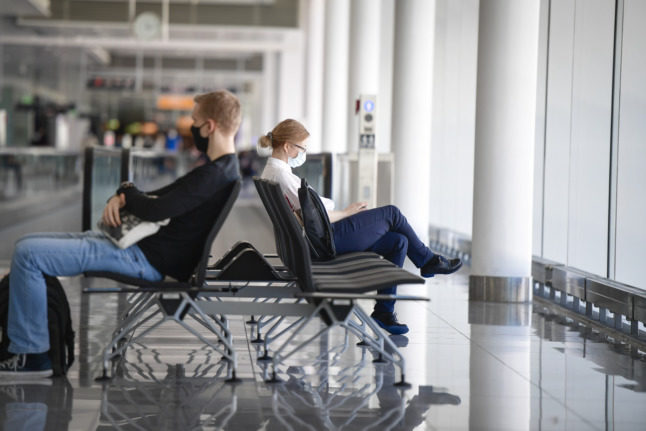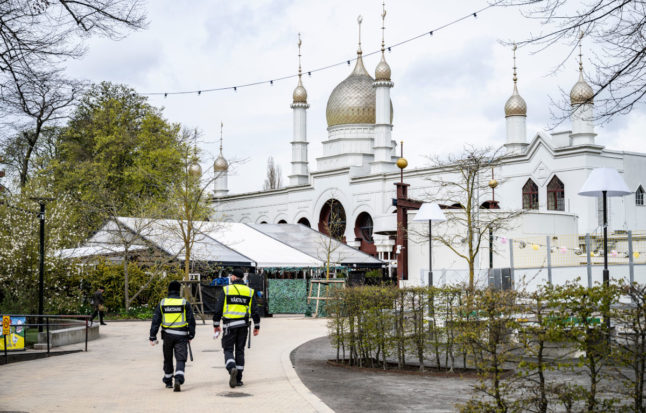Sweden’s travel ban is confusing at the best of times, with different rules for EU and non-EU countries, “exempt” countries and “approved” countries.
If you’ve had a look at the recommendations recently to see if you’re allowed to enter, you may have been left scratching your head over which rules apply to you.
As a general rule, those arriving from Nordic or EU countries do not need to show any Covid-19 documentation to be allowed into the country.
Non-EU or “third country” arrivals are not allowed to enter Sweden unless they are covered by an exemption from the travel ban or travelling from an exempted country. EU citizens are allowed to enter Sweden but must show a Covid-19 certificate if entering from a non-EU country.
If travellers are covered by an exemption from the travel ban, they still need to provide an accepted certificate of vaccination against Covid-19, a negative test or, in some cases, a proof of recovery to enter the country. For some travellers, a vaccine pass is mandatory. See below for more details.
Swedish citizens and people resident in Sweden continue to be excused from any requirement to show a negative test or valid vaccine pass.
An important point to note here is that these rules apply to the last country you were in before arriving in Sweden. So if you flew to Copenhagen Airport and are planning on taking the train to Malmö in Sweden – or changing flights and flying to Stockholm – you count as an arrival from Denmark, and not an arrival from the country where your journey began. Note that just because you’re allowed in to Sweden doesn’t necessarily mean you’re allowed in to Denmark, so make sure to check the rules for entering any transit countries before travelling.
The general rules are as follows:
Arrivals from EU/EEA countries
This applies to all EU/EEA countries, including the Nordic countries. There is no ban on entry, and travellers do not need to present a negative test, proof of vaccination or other proof that they are not currently infected with Covid-19.
Note that non-EU/EEA citizens or residents entering Sweden from an EU/EEA country are covered by the rules for arrivals from the EU/EEA when entering Sweden, not the rules for non-EU arrivals.
This means that residents of a country subject to Sweden’s travel ban are able to enter Sweden if they enter from another country which is currently exempt from the travel ban, as long as they also have a negative test, valid vaccine pass or proof of recovery from Covid-19.
Note that this is subject to the other country’s entry requirements, so do check with relevant country authorities and make sure you are also able to enter any transit countries on your way to Sweden.
Arrivals from non-EU/EEA countries
As a general rule, people arriving from these countries are subject to Sweden’s travel ban unless one of the following apply:
- you are a Swedish citizen
- you are an EU/EEA citizen
- you have long-term residence status or a residence permit in Sweden or another EU country
- you are a UK citizen who has applied for or been granted post-Brexit residence status
- you have a visa for Sweden or another EU country
- you have a vaccine certificate from an approved country
- you have a “close family connection” to someone who is in one of the above categories (this includes spouse, cohabiting partner or children under 18)
- you live in an exempted country
- you are applying for asylum in Sweden
If covered by an exemption, you will, in most cases, also have to provide proof that you are not currently infected with Covid-19 in the form of a negative test result under 72 hours old, a vaccine certificate from the EU or an approved country, or a valid recovery certificate, if you are arriving in Sweden from a non-EU country. See here for details on which recovery certificates are valid.
Swedish citizens, long-term residents of Sweden, and asylum seekers are exempt from testing and certificate requirements.
There are also exceptions for different professions, asylum seekers and students holding a residence permit for studies in Sweden. A full list of these exceptions are listed on the Swedish police’s website.
What is the difference between an exempt and an approved country?
Exempt countries are countries whose residents are no longer subject to the travel ban but whose vaccine certificates have not been approved. “Exempt” refers to the travel ban – they are exempt from the travel ban, but not from the testing requirement.
This means that residents of these countries are allowed to travel to Sweden, but must provide a negative Covid-19 test less than 72 hours old, an EU Covid Certificate or a vaccine certificate issued in the EEA or an approved country. Note that a vaccine certificate from an exempt country is not valid for travel to Sweden, unless the holder is entering Sweden directly from an EU/EEA country.
This list is not based on citizenship, so if you are a foreigner living in an exempt country, you just need to prove your residency (and present a negative test or an accepted vaccine certificate).
Approved countries are countries where vaccine certificates have been approved as being equal to an EU-issued certificate.
Fully vaccinated travellers entering Sweden with a vaccine certificate issued in an approved country at least 14 days ago are also exempt from the travel ban and do not need to show a negative test for Covid-19 in order to enter Sweden.
You do not need to be a resident or citizen of an approved country for this to apply.
Note that this only applies to fully vaccinated travellers – travellers who only show a negative test from an approved country will not be allowed to enter Sweden, unless entering from a country that’s also on the exempt list. At the time of publication, the only countries on both lists are New Zealand and the United Arab Emirates (UAE), but this may change.
For a list of current approved and exempt countries, see here, under “Exempted countries and approved countries”. This list is regularly updated, so make sure you check that your country is still listed if planning a trip to Sweden.
The above information was correct to the best of our knowledge at the time of publication. Please be aware that we are not a government authority and cannot issue any guarantees about whether or not you will be able to travel to Sweden. We always advise readers to also consult the official information on the Swedish border police’s website HERE and HERE before travelling.
If you have any questions, you are always welcome to contact our editorial team at [email protected]. We may not be able to reply to every email, and we cannot advise on individual cases, but we read all emails and use them to inform our future coverage.
Originally published November 2nd, 2021. Updated March 24th, 2022.



 Please whitelist us to continue reading.
Please whitelist us to continue reading.
Member comments